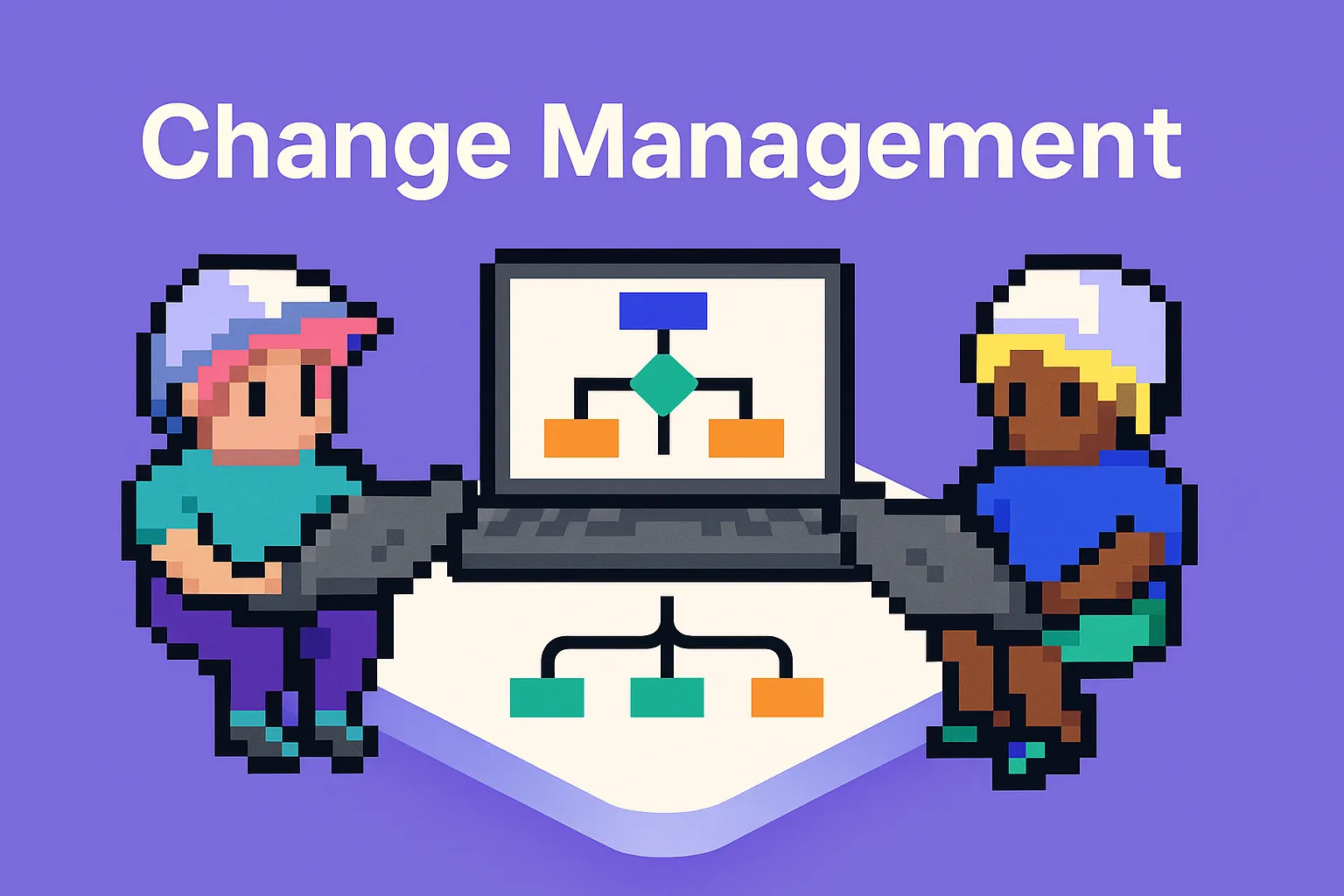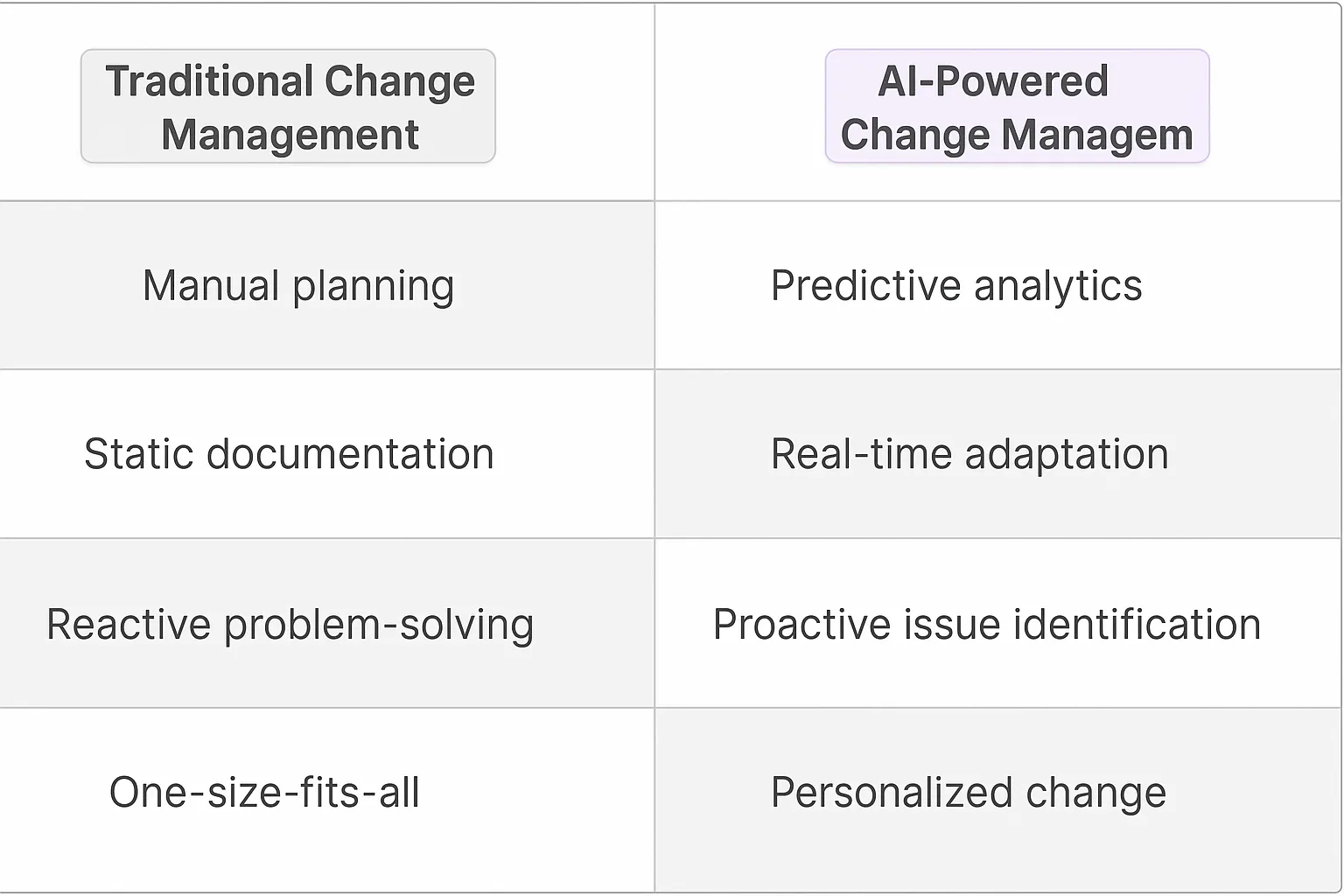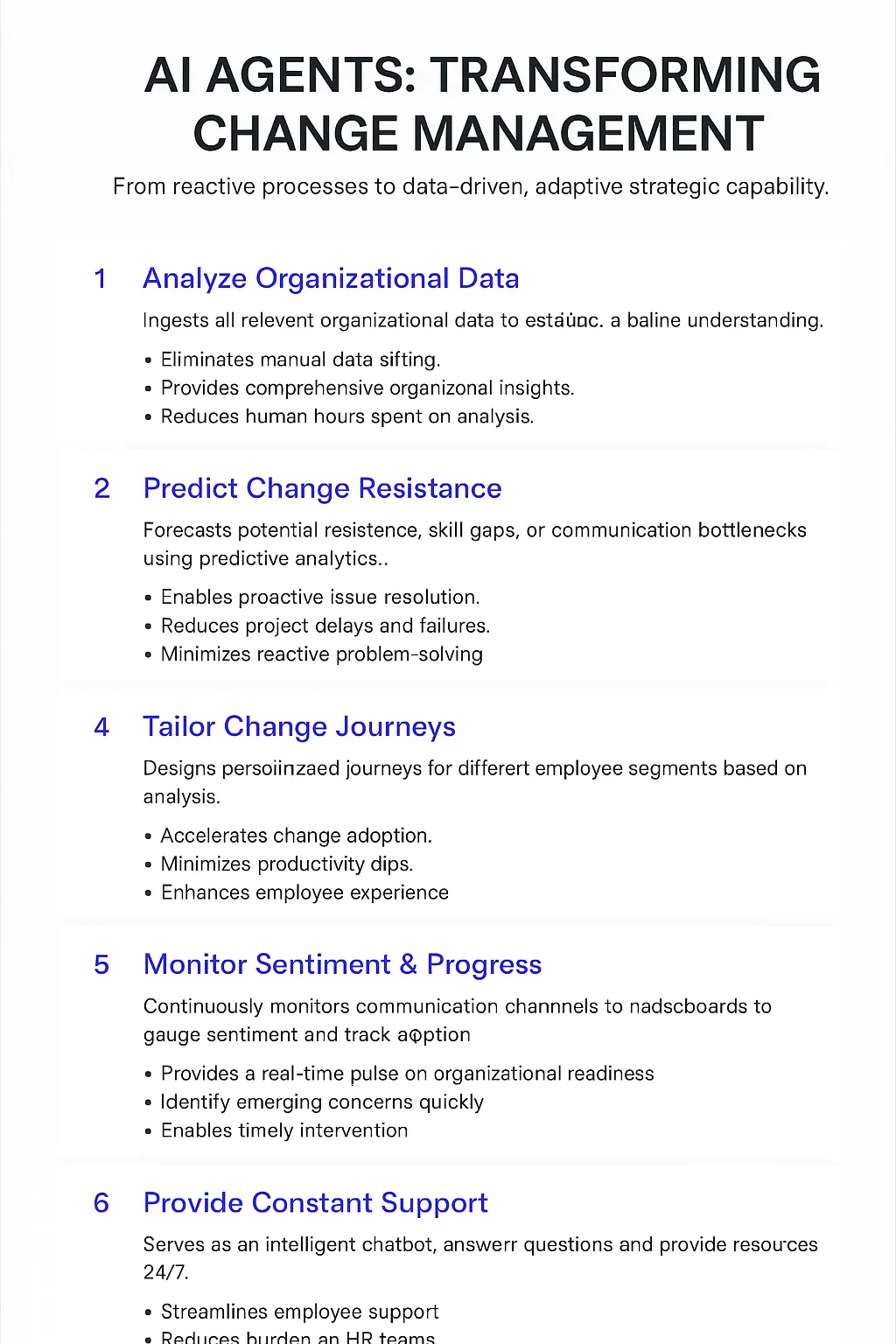Change Management Planning AI Agents
The Evolution of Change Management with AI Agents
What is Change Management Planning?
Change Management Planning is the strategic process of preparing, supporting, and guiding individuals, teams, and entire organizations through significant transitions. It's about minimizing resistance, maximizing adoption, and ensuring that changes stick. In the past, this was largely a manual, intuition-driven process. Now, AI is rewriting the playbook.
Key Features of Change Management Planning
AI-powered Change Management Planning brings a suite of game-changing features to the table. We're talking predictive analytics that forecast potential roadblocks before they materialize. Personalized change journeys tailored to individual employees' needs and behaviors. Real-time adaptation capabilities that adjust strategies on the fly based on continuous feedback. And sentiment analysis at scale, giving leaders an unprecedented pulse on organizational mood and readiness. These aren't just incremental improvements - they're quantum leaps in how we approach organizational change.

Benefits of AI Agents for Change Management Planning
What would have been used before AI Agents?
Before AI agents entered the scene, change management planning was a manual, time-consuming process. Teams relied on spreadsheets, static documents, and endless meetings to coordinate complex organizational shifts. Project managers juggled multiple stakeholders, trying to keep everyone aligned while battling resistance and communication gaps. It was like trying to orchestrate a symphony with musicians in different rooms – possible, but incredibly inefficient.
Traditional change management tools offered some structure, but they lacked the dynamic, responsive nature needed for today's fast-evolving business landscape. These legacy systems couldn't adapt in real-time or provide the personalized guidance that modern organizations crave.
What are the benefits of AI Agents?
AI agents are transforming change management planning into a high-precision, adaptive process. They're not just tools; they're digital teammates that augment human capabilities in ways we're only beginning to grasp. Here's why they're game-changers:
1. Predictive Analytics on Steroids: AI agents can crunch vast amounts of data to forecast potential roadblocks and resistance points. They're like having a crystal ball that's actually backed by data-driven strategy. This foresight allows teams to proactively address issues before they derail the entire change initiative.
2. Personalized Change Journeys: One-size-fits-all approaches are dead. AI agents can tailor communication and training plans for each employee based on their role, past behavior, and even personality traits. It's like having a personal change coach for every member of your organization.
3. Real-time Adaptation: Change is fluid, and now your planning can be too. AI agents continuously monitor progress and sentiment, adjusting strategies on the fly. They're the ultimate agile partners, ensuring your change management plan evolves as quickly as your business needs.
4. Sentiment Analysis at Scale: Forget annual surveys. AI agents can analyze communication patterns, feedback, and even social media to gauge employee sentiment in real-time. It's like having your finger on the pulse of the entire organization, all the time.
5. Knowledge Integration: AI agents break down silos by integrating insights from across the organization. They can connect dots that humans might miss, surfacing valuable insights that drive more effective change strategies.
6. 24/7 Support: Change doesn't happen 9-to-5, and neither do AI agents. They provide round-the-clock support, answering questions and guiding employees through the change process at any time. It's like having a change management expert on call, always.
The bottom line? AI agents are turning change management from a reactive, often painful process into a proactive, data-driven strategy. They're not replacing human change leaders – they're amplifying their capabilities, allowing them to orchestrate change with unprecedented precision and adaptability. As organizations continue to grapple with constant disruption, those leveraging AI agents for change management will have a significant competitive edge. The future of change is here, and it's powered by AI.

Potential Use Cases of AI Agents for Change Management Planning
Processes
Change management planning is a critical process that often gets overlooked or rushed. AI agents can transform this process, making it more efficient and effective. They can analyze vast amounts of data from previous change initiatives, identifying patterns of success and failure. This deep learning approach allows organizations to craft change strategies that are data-driven and tailored to their specific context.
AI agents can also simulate various change scenarios, providing leaders with a virtual sandbox to test different approaches. This capability is game-changing. Instead of relying on gut feelings or limited past experiences, decision-makers can now explore multiple pathways and their potential outcomes before committing to a course of action.
Tasks
On a more granular level, AI agents excel at breaking down the change management process into actionable tasks. They can generate comprehensive checklists, ensuring no critical step is overlooked. But it's not just about task creation - these digital teammates can prioritize tasks based on their impact and urgency, helping teams focus on what truly matters.
One of the most exciting applications is in stakeholder analysis. AI agents can sift through employee data, communication patterns, and even social media sentiment to map out the complex web of stakeholders affected by a change. They can identify potential champions and resistors, allowing change managers to tailor their approach for maximum buy-in.
Another killer feature? Real-time adaptation. As the change process unfolds, AI agents can continuously monitor key metrics and feedback, suggesting course corrections on the fly. This agility is crucial in today's dynamic business environment where the only constant is change itself.
The potential of AI in change management planning is massive. It's not about replacing human judgment, but augmenting it with data-driven insights and predictive capabilities. As organizations grapple with increasingly complex transformations, these AI agents will become indispensable allies in navigating the choppy waters of change.

Industry Use Cases
AI agents are reshaping change management planning across sectors, offering tailored solutions that adapt to each industry's unique challenges. These digital teammates aren't just tools; they're catalysts for transformation, enabling organizations to navigate complex transitions with unprecedented agility and insight. Let's dive into some concrete examples of how AI is elevating change management in different fields, showcasing the tangible impact on workflows and organizational dynamics.
From healthcare to finance, manufacturing to education, AI agents are proving their worth by providing data-driven insights, automating routine tasks, and offering personalized guidance throughout the change process. They're not replacing human expertise but amplifying it, allowing change managers to focus on high-level strategy while AI handles the heavy lifting of data analysis and implementation tracking.
As we explore these use cases, you'll see how AI is not just a buzzword but a practical, powerful ally in executing successful change initiatives. It's about augmenting human capabilities, fostering collaboration, and driving outcomes that were once thought impossible. Let's examine how different industries are leveraging AI to turn the often daunting task of change management into a strategic advantage.
Retail Revolution: Change Management AI in Action
Let's talk about how Change Management Planning AI Agents are reshaping the retail landscape. It's not just about moving products anymore; it's about moving entire organizations through seismic shifts.
Take a major retail chain facing the e-commerce tsunami. They're not just adding a website; they're rewiring their entire DNA. This is where Change Management AI steps in, becoming the digital sherpa guiding the company through treacherous terrain.
These AI agents start by ingesting vast amounts of data - sales figures, employee feedback, customer behavior patterns, and market trends. They're not just crunching numbers; they're building a living, breathing model of the organization's ecosystem.
Now, here's where it gets interesting. The AI doesn't just spit out a one-size-fits-all change plan. It crafts personalized strategies for different segments of the workforce. Store managers in urban areas might get a different playbook than those in rural locations. The AI recognizes that change isn't just about new processes; it's about shifting mindsets.
But here's the kicker - these digital teammates are learning and adapting in real-time. As the change rollout progresses, they're constantly analyzing feedback, identifying friction points, and fine-tuning the approach. It's like having a team of expert consultants working 24/7, but with the processing power of a supercomputer.
The result? A retail giant that doesn't just survive the e-commerce wave but rides it to new heights. Employees feel heard and supported. Customers experience a seamless blend of digital and physical shopping. And the C-suite? They're not just managing change; they're orchestrating a symphony of transformation.
This isn't just theory. We're seeing early adopters in retail achieving change success rates that were previously unthinkable. It's not about replacing human decision-making; it's about augmenting it with AI-powered insights and agility.
The retail landscape is littered with the remains of companies that couldn't adapt. Change Management AI Agents are ensuring that the next chapter of retail history is written by those who embrace the future, not fear it.
Manufacturing Metamorphosis: AI-Driven Change in the Factory
Let's dive into how Change Management Planning AI Agents are transforming the manufacturing sector. This isn't your grandfather's assembly line anymore - we're talking about a complete reinvention of how things get made.
Consider a legacy automotive manufacturer facing the electric vehicle revolution. They're not just swapping out engines; they're rewiring their entire production philosophy. Enter the Change Management AI, the digital catalyst accelerating this massive shift.
These AI agents begin by devouring data from every corner of the operation - production metrics, supply chain logistics, workforce skills, market demands, and even regulatory forecasts. They're constructing a dynamic, multi-dimensional model of the entire manufacturing ecosystem.
But here's where it gets really interesting. The AI doesn't just churn out a generic transition plan. It crafts tailored strategies for different facets of the organization. Engineers might receive AI-generated upskilling pathways to master EV tech, while line workers get personalized retraining schedules. The AI recognizes that change isn't just about new machines; it's about evolving human capital.
The real magic happens in real-time. As the transformation unfolds, these digital teammates continuously analyze progress, identify bottlenecks, and recalibrate the approach. It's like having a team of McKinsey consultants embedded in every department, but with the processing power to crunch petabytes of data in seconds.
The outcome? A manufacturing giant that doesn't just survive the EV transition but leads the charge. Workers feel empowered and future-proofed. Supply chains morph from rigid to responsive. And the leadership? They're not just managing a change project; they're conducting an orchestra of innovation.
This isn't pie-in-the-sky thinking. Early adopters in manufacturing are seeing change success rates that make traditional approaches look like horse-and-buggy thinking. It's not about AI replacing human judgment; it's about amplifying it with data-driven insights and unprecedented adaptability.
The manufacturing world is full of cautionary tales of companies that couldn't pivot. Change Management AI Agents are ensuring that the next industrial revolution is led by those who embrace AI-powered agility, not those who cling to outdated playbooks.
Considerations
Technical Challenges
Implementing a Change Management Planning AI Agent isn't just about plugging in some fancy tech and watching the magic happen. It's a complex dance of algorithms, data, and human interaction that requires careful choreography.
First off, we're dealing with the challenge of data integration. Change management involves pulling information from various sources across an organization - HR systems, project management tools, communication platforms, and more. Getting all these disparate data sources to play nice with our AI agent is like trying to get a group of cats to march in formation.
Then there's the issue of natural language processing. Our AI agent needs to understand the nuances of human communication, including context, tone, and intent. It's not just about recognizing keywords; it's about grasping the underlying meaning behind messages and documents. This is especially crucial in change management, where emotions and resistance can be expressed in subtle ways.
We also can't ignore the elephant in the room: bias. AI models are only as good as the data they're trained on, and if that data reflects existing biases in change management practices, we risk perpetuating those biases at scale. Addressing this requires ongoing vigilance and a commitment to diverse, representative training data.
Operational Challenges
On the operational side, we're looking at a whole different set of hurdles. The first is the classic "human vs. machine" dilemma. Employees might view the AI agent as a threat to their jobs or a Big Brother-esque monitoring tool. Overcoming this resistance requires a delicate balance of transparency, education, and demonstrating the AI's role as a supportive tool rather than a replacement.
There's also the question of how to integrate the AI agent into existing change management processes. It's not just about dropping a new tool into the mix; it's about rethinking workflows, redefining roles, and potentially restructuring teams. This kind of organizational change can be messy and time-consuming, requiring strong leadership and clear communication.
Another operational challenge is the need for continuous learning and adaptation. Change management isn't a static field, and our AI agent needs to keep up with evolving best practices, new methodologies, and shifting organizational dynamics. This means investing in ongoing training and refinement of the AI model, which can be resource-intensive.
Lastly, we can't forget about the ethical considerations. An AI agent involved in change management will be privy to sensitive information about organizational strategy, employee performance, and potential restructuring. Ensuring data privacy, maintaining confidentiality, and using this information responsibly are critical challenges that need to be addressed head-on.
Implementing a Change Management Planning AI Agent is no walk in the park. It's a complex undertaking that touches on technical, operational, and ethical challenges. But for organizations willing to navigate these hurdles, the potential rewards in terms of more effective, data-driven change management are substantial. It's not about replacing human expertise, but augmenting it with AI-powered insights and capabilities.
The Future of Change: AI-Powered Transformation
The integration of AI Agents into Change Management Planning isn't just a trend - it's a paradigm shift. We're moving from change management as an art to change management as a data-driven science. These digital teammates are enabling organizations to navigate complex transitions with unprecedented precision, adaptability, and insight. But let's be clear: AI isn't replacing human change leaders. Instead, it's amplifying their capabilities, allowing them to orchestrate change at a level of sophistication that was previously unimaginable. As we look to the future, organizations that embrace this AI-augmented approach to change will be the ones that thrive in an increasingly volatile, uncertain business landscape. The future of change is here, and it's powered by AI. Those who adapt will lead; those who don't risk being left behind.













